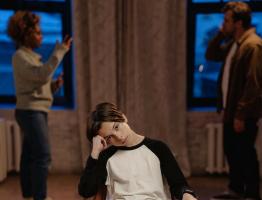What you need to know about social anxiety in children
Does your child feel extremely uncomfortable in social situations? Most parents assume it is due to shyness and that their children are simply more shy than other children.
The truth is that it is completely normal to feel shy in some situations, such as when speaking in front of the whole class. But nevertheless, in the case of some children it is more than simple shyness, we may be facing a social anxiety disorder. In this article we will talk in detail about this anxiety disorder.
- Related article: "Types of Phobias: Exploring Fear Disorders"
What is social anxiety in children?
Social anxiety disorder is a specific type of anxiety disorder that is triggered when the child is confronted with social situations. It's important to be clear that social anxiety is more than shyness or embarrassment. Children with social anxiety disorder are extremely uncomfortable in social settings. In addition, your ability to perform everyday tasks is affected.
Children with this type of anxiety worry about how other people perceive them in social situations. That is to say,
have a lot of concerns about meeting or talking to people, and constantly fear being embarrassed, negatively judged, or rejected. In many cases it happens that they only feel comfortable with people they know very well.This intense fear of social situations often makes it difficult for the child to make new friends and enjoy the company of other people.
As a consequence of the anxiety generated by social situations, children often end up avoiding these situations. But it is precisely in these situations that children learn social rules and how to act with others. In this way, social anxiety becomes a vicious cycle that prevents children from acquiring the social skills they need to function in the world.

In general, children with social anxiety have difficulty meeting other children or joining groupsThey tend to have a limited number of friends and avoid social situations.
Some social situations that can trigger this anxiety are the following: speaking in public, reading aloud, interacting with new people, participate in groups, attend social gatherings where there are many people and go to extracurricular activities where they do not know the other children, among others.
Also, that social anxiety disorder can cause significant distress, can have a negative effect on academic performance, social relationships, self-confidence and other important areas of functioning in the child's life.
- You may be interested: "The 6 stages of childhood (physical and mental development)"
Symptoms of social anxiety in children
Social anxiety symptoms can be reflected in three areas: physical, emotional and behavioral. It is also important to note that this disorder presents differently in each child. Here are the symptoms of children with anxiety disorder:
- Afraid to meet or talk to people (especially people they don't know at all or don't trust).
- Extreme self-consciousness in social settings.
- The distress can begin days or weeks before the social event.
- In social situations become excessively attached to known people.
- Have tantrums in social situations in which they feel anxious.
- Avoid situations that trigger social anxiety, such as going to public restrooms, talking to teachers, or attending birthday parties.
- cry or show sadness in social settings.
- Ask frequent questions that are meant to put you at ease, like, "What if I get the teacher's question wrong?" or "What if I fall at the school play?"
- Refuse to speak in certain situations.
- Speak quietly and avoid eye contact.
Social anxiety, like other types of anxiety, also often has physical signs, such as nausea, stomach pain, palpitations, flushing, dizziness, and tremors.
In anxiety disorder, fear or anxiety about a certain social situation disproportionate to actual threat and the fear, anxiety, and avoidance must last for at least six months. In addition, another symptom is that it causes the child clinically significant distress in social, school, or other areas of functioning.
- Related article: "Child therapy: what is it and what are its benefits"
To do?
If social anxiety disorder negatively affects your child's ability to attend school school, socializing with other children, or affects other areas of their daily functioning, it may be a good idea seek help from a mental health professional that you can perform an adequate evaluation to discern if it is shyness or social anxiety.
The good news is that social anxiety disorder can be treated in children with very good results.

